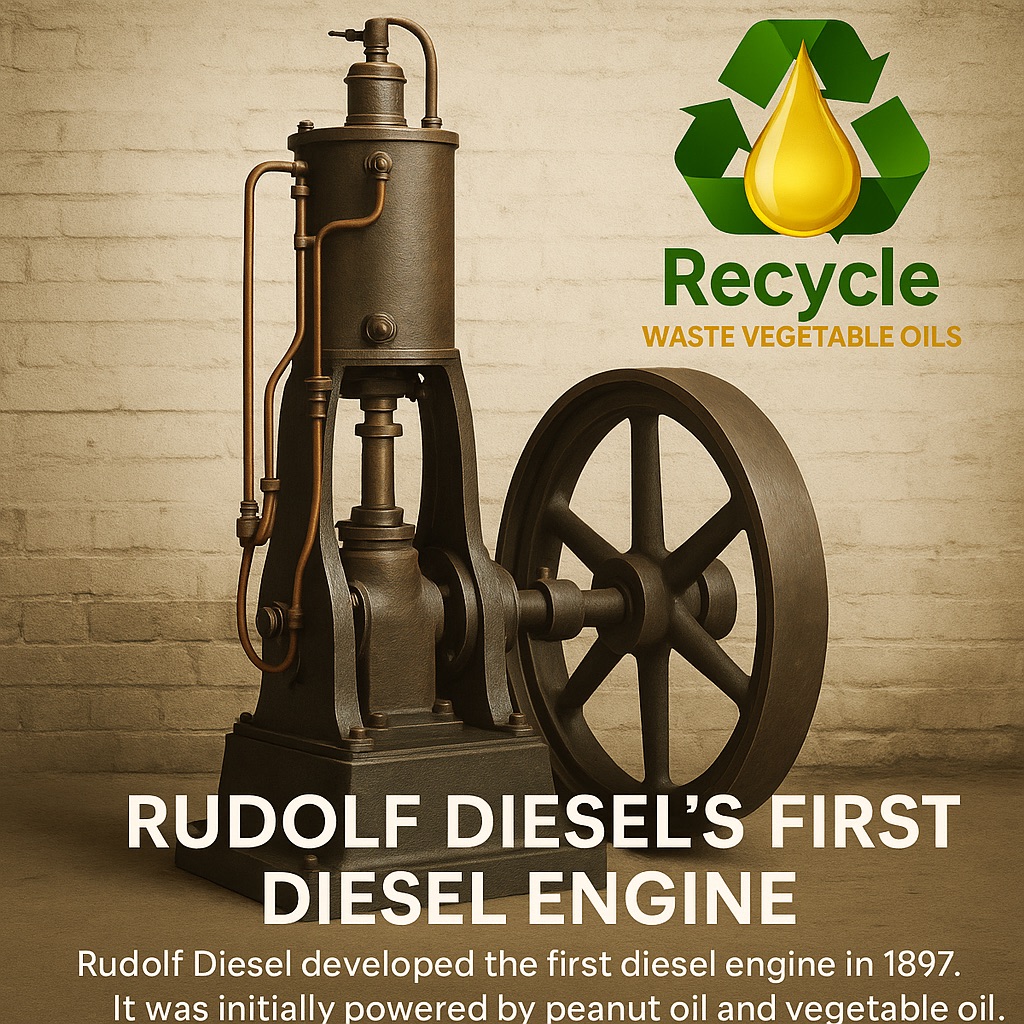Home / About / Services / Contact / North Yorkshire / East Riding Yorkshire / South Yorkshire / West Yorkshire / Greater Manchester / Derbyshire / Reference / FAQ

Rudolf Diesel’s First Diesel Engine
In 1897, a monumental breakthrough changed the course of industrial energy forever. Rudolf Diesel, a German inventor and engineer, successfully built and tested the first diesel engine—a machine that would not only revolutionize mechanical power but also offer an alternative to fossil fuels. Remarkably, this engine was capable of running on vegetable oils, including peanut oil, setting the foundation for what we now call biofuels.
Diesel’s invention emerged from a desire to create a more efficient and economical engine than the steam engines of his time. He wanted to reduce fuel consumption while improving power output. His work laid the foundation for the modern compression-ignition engine, which today powers vehicles, ships, backup generators, and more. But beyond its mechanical achievement, Diesel’s vision extended far beyond industry. He believed his engine could empower farmers, small manufacturers, and off-grid communities by enabling them to produce their own fuel from plants.
The 1897 Engine: A Technological Breakthrough
Diesel’s first working engine, developed at Maschinenfabrik Augsburg (which later became MAN), was a single-cylinder, four-stroke compression ignition engine. Unlike steam engines that relied on external combustion and water pressure, the diesel engine compressed air to extremely high temperatures, then injected fuel that ignited spontaneously under heat and pressure. This new method provided superior fuel efficiency and eliminated the need for an external boiler.
The first successful test of this engine took place on February 17, 1897. The engine achieved an efficiency of over 26%, which was almost double that of the typical steam engine at the time. This astounding achievement drew immediate attention from engineers, manufacturers, and industry leaders across Europe.
Running on Vegetable Oils
While early prototypes used petroleum-based fuels, Diesel soon demonstrated that his engine could run on a variety of plant-based oils. At the 1900 Paris World Exhibition, one of his engines ran on 100% peanut oil without any modification. This proof-of-concept was intended to show that engines could operate on agricultural oils—resources that were renewable, locally produced, and independent of oil corporations.
In his writings, Diesel expressed support for using vegetable oils as a serious fuel alternative. He specifically mentioned oils from peanuts, castor beans, and rapeseed, envisioning a world in which farmers could grow their own fuel and avoid dependence on centralized fossil fuel systems. In his own words, “The use of vegetable oils for engine fuels may seem insignificant today. But such oils may become, in the course of time, as important as petroleum.”
Design and Function of the First Engine
The 1897 diesel engine had a vertical design, with a large flywheel and thick cast iron components. It used a high compression ratio—far greater than gasoline engines of the time—which enabled autoignition of the injected fuel. The engine had no spark plugs, instead relying on thermal compression to ignite fuel. Key components included:
- A high-pressure cylinder
- Air compressor for pre-compression
- Fuel injector (manually operated)
- Large flywheel to stabilize rotational momentum
- Heavy-duty cast housing
This design, although bulky by today’s standards, was groundbreaking. It proved that internal combustion could be more efficient, more powerful, and more flexible than ever before—capable of running on a wide range of fuels, including oils derived from plants.
Diesel’s Social and Environmental Vision
Rudolf Diesel was more than an inventor—he was a thinker with deep concern for society’s future. At the turn of the 20th century, the industrial revolution had caused rapid urbanization and rising fuel demands. Diesel saw an opportunity to bring balance by creating a fuel system that could work in rural settings, off the grid, and independent of major industrial powers.
His dream was especially focused on supporting agriculture and decentralizing energy. He believed small producers could cultivate oil-bearing plants and power their farms, mills, and machinery using fuel they made themselves. He saw vegetable oils not only as an alternative but as a means to energy equity and economic empowerment for the working class and developing nations.
The Long-Term Impact of the First Diesel Engine
Though Diesel’s engine was later adapted for petroleum fuels due to cost and availability, the concept of plant-based fuel never disappeared. In fact, his original work directly inspired today’s biodiesel industry. Waste vegetable oil, used cooking oil, and plant oils are now being repurposed into clean, renewable fuels compatible with modern diesel engines. This circular approach to energy is now central to global sustainability efforts.
Today, biofuel made from waste vegetable oil powers delivery fleets, public transport, backup generators, and even aircraft. And at the heart of it all is a 19th-century invention that proved vegetable oils could do the job just as well as fossil fuels—if not better.
Continuing Diesel’s Legacy
As a modern waste oil collection service, we draw direct inspiration from Rudolf Diesel’s early work. The oils we collect from commercial kitchens, food processors, and hospitality businesses are not just waste—they’re fuel. When processed correctly, waste vegetable oil becomes a clean, renewable energy source that supports the very ideas Diesel championed over a century ago.
By recycling used cooking oil, we reduce landfill waste, lower greenhouse gas emissions, and contribute to the renewable energy economy. Just as Diesel’s first engine represented innovation, sustainability, and independence, so too does every drop of repurposed vegetable oil we help recover and convert into clean fuel.
Conclusion
Rudolf Diesel’s first engine was more than a mechanical success—it was a visionary leap. Built in 1897 and proven to run on peanut oil and other vegetable oils, it set the stage for a global shift toward sustainable energy. Diesel’s belief in the power of plant-based fuel continues to inspire the modern biofuel movement. Today, we honour his vision by reclaiming waste vegetable oil and turning it into a force for good.
Last updated - 13/06/2025






